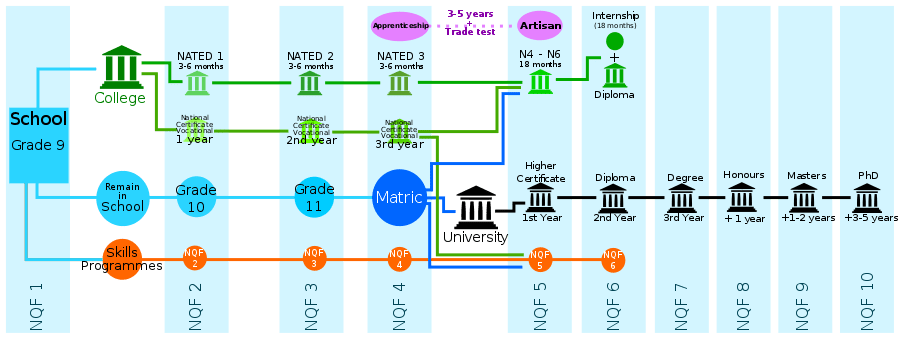
Yes – you can study at college or university with a GED®.
Students can write the GED® at age 17 and then start online degrees, diplomas or higher certificate courses at 17 or take steps to be eligible for South African university degrees by age 18. Read more below about how it all works.
The GED® is recognised in South Africa
*SAQA (the South African Qualifications Authority) has evaluated the GED® and found the National Senior Certificate or NQF 4 as its closest comparable qualification.
NQF refers to the National Qualifications Framework.

An infographic of the NQF and different educational options within the South African educational system in 2017. Image source: Driscott, Wikipedia
GED® graduates can pursue the following pathways to further study at tertiary level. (The usual requirement for admission is shown in brackets.)
1. Online University Degrees at Boston City Campus
2. NQF 5 Higher Certificate (GED)
3. NQF 6 Diploma (GED)
4. Degree at an Online Overseas University (GED)
5. Degree at an Offline Overseas University(GED or GED+SAT)
6. Degree at a South African University (GED + NQF 5, GED + SAT + Senatorial Discretion)
1. Online University Degrees
at Boston City Campus and Business College
Following an announcement in October 2021, Boston is now the most GED-friendly tertiary institution in South Africa. The registrar, Ruan Venter announced that Boston will accept GED graduates who meet the admission criteria (without a SAQA Certificate) and that Boston will handle and support the student’s application for exemption from USAf.
For more information please read the information and view the webinar recording at Boston Accepts GED Graduates for Degrees
2. Higher certificate (NQF 5) courses
These are one-year, career-oriented courses offered by colleges and universities. According to SAQA, the admission requirement is an NQF 4 qualification. After completion of an NQF 5 course a student may be eligible for exemption from Universities South Africa (USAf), by virtue of academic qualifications and may apply for admission to a degree course at a South African university. See more detail below at #5.
Here is a list of online higher certificates that students can study. There are many, many more options to choose from at offline colleges and universities around South Africa.

3. Diploma (NQF 6)

A diploma course is usually a two-year or sometimes a three-year course. According to the SAQA website, the admission requirement is an NQF 4 qualification. (Always check for additional requirements with the individual institution of your choice too.) After completion of a diploma a student may be job-ready or they may apply for admission to a degree course if they choose. (Refer to #5 below.)
Here is a list of online diploma courses. There are many other offline diploma courses that you can choose from at local colleges and universities.
4. Degree at an online overseas university
South African graduates with a GED® have already been accepted at the following online universities. They do not require exemption from USAf.
- University of the People is an accredited US university online that accepts students with a GED® only
- American Business and Technology University accepts students with a GED®
There are many other online overseas universities. Some may also require a student with a GED® to have written the SAT. The SAT is a US college entrance exam, which can be written in SA and internationally. Click here for more online university degrees.

Back to top
5. Degree at any offline overseas university

The GED® is accepted at many universities around the world. Every university has international admission requirements to allow for the global mobility of students.
Most universities accept American credentials such as a GED® or high school diploma plus a prescribed score on the SAT college admission test.
For example:
- 98% of US universities accept students with a GED.
- 100% of universities in New Zealand accept students with a GED + prescribed score on the SAT or ACT tests.
Here is the GED Testing Service’s list of international universities that accept students with a GED®. There are sure to be others. Always check the international admission requirements and request confirmation from the university of your choice in advance.
6. Degree (NQF 7) at a South African university
A candidate must have qualified for exemption from Universities South Africa (USAf) in order to be admitted to a degree course at a South African university.
A degree is usually a 3- or 4-year course of study, ranked at NQF 7.
The following are possible categories of exemption:
6.1 Complete exemption by virtue of academic qualifications
The requirements for this option are prescribed in the Higher Education Act 101 of 1997 in the quotation in blue text below, specifically paragraph (c ):
6.1.1 If a student achieves an NQF 5 (Higher Certificate) or NQF 6 (diploma) qualification then they should qualify for complete exemption.
6.1.2 if a student completes a first-year degree at a recognised overseas university, either online or offline, then they should qualify for complete exemption.

“Certificate of complete exemption by virtue of academic and professional certificates
17.
The Committee of Principals shall issue a certificate of complete exemption to –
(a)
a graduate-by-examination of a university or other institution approved by the Committee of Principals; or
(b)
a person who has passed examinations at a university or other institution approved by the Committee of Principals and who satisfied all the requirements of a qualification which in the opinion of the Committee of Principals is equivalent to an approved university degree; or
(c)
a person who has passed examinations at a university or other institution approved by the Committee of Principals which represent a minimum of, or the equivalent of a minimum of 120 credits, registered at level 5, or higher, on the National Qualifications Framework of the South African Qualifications Authority; or
(d)
a medical or dental practitioner duly registered to practice as such under the provisions of the Medical, Dental and Supplementary Health Services Professions Act, 1974 (Act 56 of 1974).”
Since each faculty of each university may set its own admission requirements above the minimum requirements set by USAf, you should always contact them in advance to confirm that you will be eligible for admission to your chosen course, as not all universities in South Africa are “GED-friendly”.
6.2 Senatorial discretionary exemption
Some colleges and universities give students an admission test and if they pass, they get accepted on the basis of the dean’s discretion. AFDA is an example. See here: AFDA Entrance Exam
Another example is Eduvos: Eduvos will accept students who complete a GED, followed by the SAT. A student must achieve a minimum required SAT Composite score as confirmed by Universities South Africa (USAf) including the sub-minimum of Evidence in Reading and Writing, and Mathematics. They must also obtain a letter/certificate of exemption from USAf. Eduvos states that students with a GED and SAT should apply to USAf for a certificate of Senatorial Discretion for admission to their degree courses.
Usually you would need to motivate why the university should give you senatorial discretionary exemption e.g. a student who has high achievement in something else, like grade 7 in music exams or some other qualification, skill or talent relevant to the degree for which they are applying. This would be granted on a case-by-case basis and would require a process of consideration. Some GED® graduates have been granted exemption in this way.
6.3 Mature age exemption
If you are age 23 or older you may qualify for exemption – but you must have a matric or alternative equivalent school leaving certificate.
6.4 Recognition of prior learning (RPL)
All higher education institutions in South African must have a policy and procedure to assess prospective students’ RPL to see if they can enter the courses with a reasonable chance of success. RPL provides a way for the university to acknowledge your knowledge and skills gained via non-formal education and/or work experience, in order to obtain admission towards a qualification. It may also include candidates lacking the minimum requirements for entry into a formal learning programme (e.g. matriculation endorsement).
PLEASE NOTE: You MUST check with the colleges or universities and specific faculty of your choice that they will accept the GED® credential with one of the categories of exemption. Many degrees and courses have additional requirements which you will also have to fulfill, no matter what NQF 4 or Grade 12 credential you have.
As with any matric option, there is no guarantee that a GED® graduate will be issued with exemption from USAf, nor that a university will accept his/her application.
The benefits of studying with Go Prep™
There are a variety of exciting pathways for GED® graduates to continue their education and get skilled and equipped for career success.
Some of the many benefits of studying with Go Prep™ are:
- the GED® is recognised and accepted by tertiary institutions
- study in the safety and security of your own home or office
- flexibility and convenience
- study at the time and place of your choice
- develop technical skills
- looks good on your CV as it indicates commitment, motivation and perseverance
- international recognition
Take the first step to success.

Over 20 million people have earned the GED® credential around the world and in South Africa. It has enabled them to study further and given them better career opportunities. We, at Go Prep™ (previously Online GED Prep), will guide you at each step so that you can become one of them too. You can enrol at any time of year and book your tests whenever you are ready. No pressure. No deadlines.
*SAQA (the South African Qualifications Authority) has evaluated the GED® and found the National Senior Certificate as its closest comparable qualification. As with any kind of matric or high school credential, there is no guarantee that a GED® graduate will be granted exemption from USAf, nor that a university will accept his/her application, as there may be other selection criteria too. Read more here: University with a GED® and read our GED Success Stories.
Disclaimer: Although every effort has been taken to provide accurate, up-to-date and correct information, Go Prep™ (previously Online GED Prep) shall never be liable for losses or other damages that may result from inaccuracy or incompleteness of information on this website about universities and their requirements.



